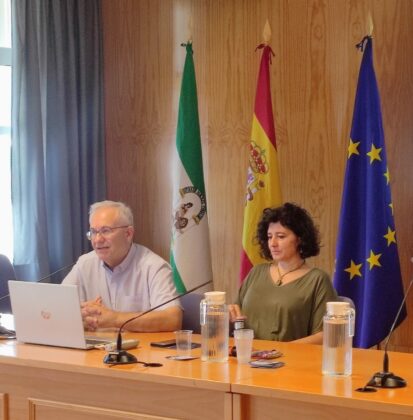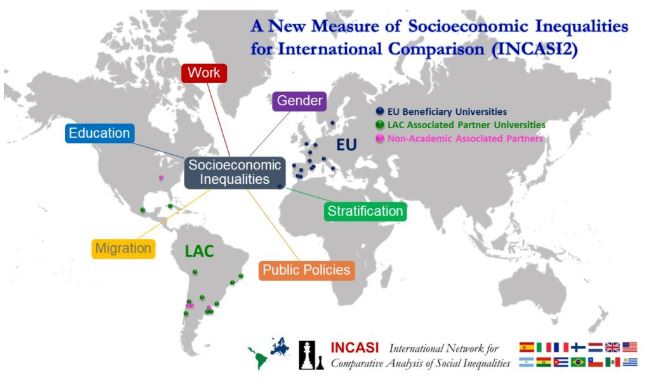September 23, 2024 | Pablo de Olavide University (Seville, Spain).
Sandra Fachelli, professor at the Department of Sociology of the Pablo de Olavide University, is in charge of subcoordinating this international project under the Horizon Europe, Marie Skłodowska-Curie Actions (MSCA) program.
With the aim of addressing socioeconomic inequalities in an international comparative perspective between Europe and Latin America and the Caribbean, researchers from the Pablo de Olavide University participate in the INCASI2 project (A New Measure of Socioeconomic Inequalities for International Comparison), an initiative that is being developed under the Horizon Europe, Marie Skłodowska-Curie Actions (MSCA), Staff Exchange (GA101130456) program between November 2023 and October 2027, with funding of 1,614,600 euros.

One of the most impactful actions of the INCASI2 project is the construction of an innovative multidimensional measure of social inequality called DYSIC: Dynamics of Socioeconomic Inequality in Comparison. As Sociology Department professor Sandra Fachelli, in charge of the project’s sub-coordination, points out, “the goal is to create a tool for examining and understanding the functioning of socioeconomic inequalities that can be used for international comparative analysis.” “This is a great challenge,” adds Luis Navarro Ardoy, also a professor in that department and a researcher on the project, ”because it requires the construction of integrative concepts of socioeconomic inequality that can be applied universally, regardless of a country’s level of development or its specific circumstances.”
The general public will be able to learn about the project in an original and didactic way on September 27, at the international science outreach event ‘La noche europea de l@s investigador@s. Women and men who do science for you’. INCASI will take part in Seville with the exhibition ‘No todo lo que brilla es oro. Mapas de las desigualdades’.
International scientific cooperation
With a network of researchers from 14 European universities from 6 countries (Spain, Italy, France, the Netherlands, Finland and Great Britain), 11 Latin American and Caribbean universities from 7 countries (Argentina, Bolivia, Cuba, Chile, Uruguay, Brazil and Mexico), and 4 non-academic organizations (Latinobarómetro, CEPAL, INTAL and LAPOP), INCASI2 is investigating socio-economic inequalities based on analyses in six lines of research: labor, education, gender, social stratification and mobility, migration and public policies.
The work of this extensive research network is being carried out through research stays, seminars and the novel INCASI Living Lab, a living laboratory on socioeconomic inequalities between Europe and Latin America and the Caribbean in order to forge international scientific cooperation on socioeconomic inequalities to solve present and future challenges and to develop practical diagnoses and conclusions that inform the design of innovative public policies aimed at addressing situations of socioeconomic inequality in collaboration with socioeconomic, political and scientific actors.
To date, a total of 22 Living Labs have been carried out, reflecting on different dimensions of inequality. Among others, on household employment and care in Spain, on access and educability conditions in municipal nursery schools in Barcelona, on temporal variations in intergenerational class mobility and the role of education in different periods in urban Argentina. All recordings are available at https://webs.uab.cat/incasi/?page_id=178.
Among the results obtained, the need to analyze the possible contradictory effects of social policies within the same country and the need to broaden professional equality policies to be more inclusive stand out. In the case of Spain, it highlights the progress in the gender equality agenda, especially with reforms in parental leave that favor co-responsibility. The policy of the first 1000 days is mentioned as an example, but warns about the medicalization of pregnancy and the expansion of the requirements of mental workload.
On the other hand, secondments are short-term research stays of a minimum of one month, carried out by researchers of the network in Latin American and Caribbean or European research centers. Exchanges are carried out according to the thematic affinity of the network’s research groups. En total, el proyecto contempla 360 meses de estancias. So far, INCASI2 has allowed 60 months.
Coordinated by the Institute of Labor Studies (IET) of the Universitat Autònoma de Barcelona, being the principal investigator of the network Pedro López-Roldán, the subcoordination of the project is in charge of Sandra Fachelli, professor of the Department of Sociology of the Pablo de Olavide University.
